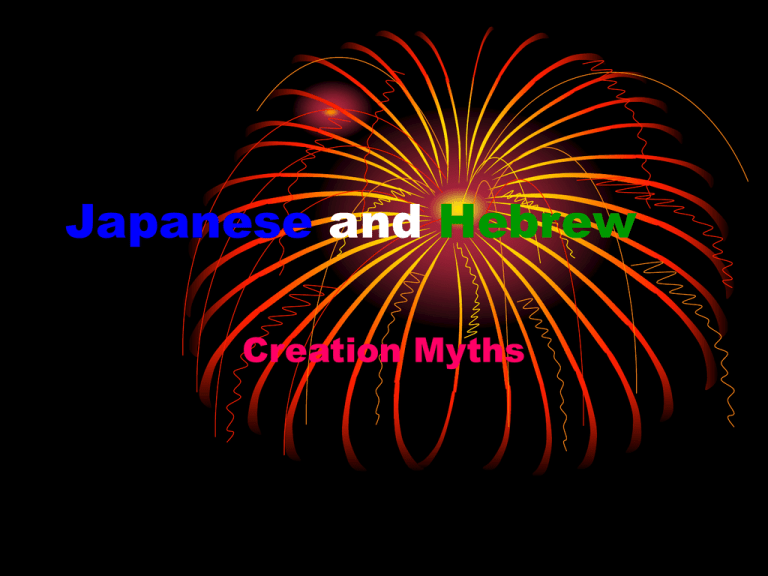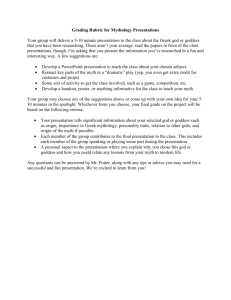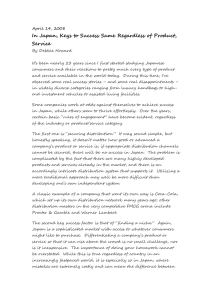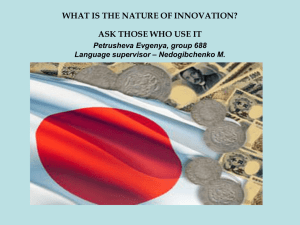Japanese and Hebrew
advertisement

Japanese and Hebrew Creation Myths Hebrew History Origin can be traced to the Syro-Arabian Desert. 1800 B.C.E. Gods revelations were first received. Abraham and his followers traveled to Canaan. 1304-1237 B.C.E. Israelites were captured and enslaved in Egypt. “In the beginning…” Genesis 1 The Hebrew Creation Myth states that God created the world in seven days. He first created light and separated the light from the darkness and created day and night, that was the first day. On the second day God separated the waters from the sky. On the third day God created land and the plants and trees. On the forth day God created the stars in the sky and the moon. On the fifth day God created the living creatures of the sea and the birds. On the sixth day God created the creatures of the land and he created human beings. On the seventh day he rested. Genesis 2 God created man from the dust of the earth and breathed life into his nostrils and named him Adam God made the Garden of Eden for the man to live. In the middle of the garden were the tree of life and the tree of the knowledge of good and evil. Adam could eat from any tree except the tree of knowledge. God then created out of the ground all the beasts of the field and all the birds of the air. God then took a rib from Adam and made a woman to be his companion and her name was Eve. Japanese History • Mixed people of Korean, Mongolian, and Malayan. • At first independent tribes. • 6,000 – 300 B.C.E.: Jomon PeriodNeolithic Hunting and Fishing. • 250 B.C.E. – 250 C.E.: Yayoi PeriodCultivation of rice. • 250 C.E. – Fifth Century C.E.: Fofun Period.- Invasion of Asiatic warriors. • Fourth Century- Yamato clans placed their Chieftain on a throne to rule over the other tribes. • Chieftain claimed to be a descendent of the Sun Goddess to overcome the other tribes who believed in women rulers. “Before the heavens and earth…” • The Japanese creation myth states that out of chaos rose a light and formed the heaven. The heaven then gave birth to the Three Creating Deities. • Then out of the earth a pair of immortals were born, Deity Umashi-Ashi-Kahinbi-Hikoji-noMikoto and Deity Ame-no-Tokotachi-no-Mikoto. • From there on many Gods were born but with the world in a “chaotic state” there was nothing for them to do. • The two divine beings Izanagi and Izanami were called to help make the world a solid place. They were given a spear called Ama-no-Nuboko to help them. • They created the Island of Onokoro by dipping the spear into the waters of the earth and the drops solidifying on top of the water. • The two deities Izanagi and Izanami traveled to the island of Onokoro and married. • They then gave birth to a succession of deities that controlled nature. Example: the wind-deity, Kami-Shinatsuhiko-no-Mikoto. • Then Izanami died after giving birth to the Goddess Mizuhame-no-Mikoto. Her demise marks the intrusion of death into the world. • After Izanami’s death Izanagi created and consolidated the Island Empire of Japan yet he was lonely and depressed without his wife. • Izanagi followed his wife to the underworld where he found her decaying. • Because he looked at her Izanani sent the Ugly sisters, eight thunder dieties and fifteen hundred warriors after Izanagi as he fled. • He fought them off and Izanani herself chased after him but he blocked the entrance to the upperworld with a bolder. • Izanagi then went to the ocean and as he cleaned out his eyes he created the Sun Goddess, Amaterasu, and the Moon God, Tsukiyomi. • The Sun Goddess then sent her grandson Ni-nigi to the islands of Japan to rule and then from him the first human Emporer took the throne, Nini-gi’s great grandson Jimmu Tenno. • This shows that all emporeres of Japan are descendents of the Sun Goddess and Japans people are descendents of the lesser dieties. Compare • Both cultures believe that before the earth was created there was nothing but chaos and was without form. Example: • Hebrew: Now the earth was formless and empty, darkness was over the surface of the deep… • Japanese: Before the heavens and the earth came into existence, all was a chaos, unimaginably limitless and without definite shape or form. • Both cultures believed that there was some type of light that followed the creation of the world. Example: • Hebrew: And god said, “let there be light,” and there was light. • Japanese: out of this boundless, shapeless mass something light and transparent rose up and formed the heaven. • Both myths show that a Deity of some kind created the land out of the waters of the earth. Example: • Hebrew: And God said, “let the water under the sky be gathered to one place, and let dry ground appear.” And it was so. • Japanese: So saying he pushed down the jeweled shaft and found that it touched something. Then drawing it up, he examined it and observed that the great drops which fell from it almost immediately coagulated into an island, which is, to this day, the Island of Onokoro Contrast • The Hebrew myth speaks of only one deity however the Japanese myth has many. Example: • Hebrew: In the beginning God created the heavens and the earth. • Japanese: Many gods were thus born in succession, and so they increased in number, but as long as the world remained in a chaotic state, there was nothing for them to do. • In the Hebrew myth it took only seven days to create the earth, yet in the Japanese myth it took many years. • Hebrew: And there was evening, and there was morning--the first day. Ect. • Japanese: Eon followed eon: then, lo! out of this boundless, shapeless mass something light and transparent rose up and formed the heaven. • The Hebrew myth mainly talks of how the world was created. The Japanese myth mainly talks of how the Deity’s were created and how they relate to the earth. Example: • Hebrew: "Let there be light," and there was light. God saw that the light was good, and he separated the light from the darkness. God called the light "day," and the darkness he called "night." • Japanese: Having, thus, made a country from what had formerly been no more than a mere floating mass, the two Deities, Izanagi and Izanami, about begetting those deities destined to preside over the land, sea, mountains, rivers, trees, and herbs. • In the Hebrew myth God created man from the dust of the earth. In the Japanese myth men are direct descendents of the dieties. Example: • Hebrew: God created man from the dust of the earth and breathed life into his nostrils and named him Adam • Japanese: The Sun Goddess then sent her grandson Ni-ni-gi to the islands of Japan to rule and then from him the first human Emporer took the throne, Ni-ni-gi’s great grandson Jimmu Tenno. Stephanie Smith Lillian King Rebecca LeMay






